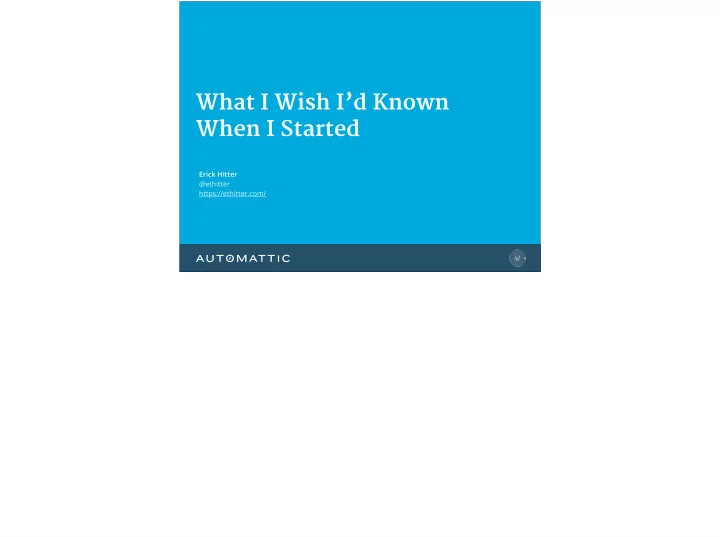

What I Wish I’d Known When I Started Erick Hitter @ethitter https://ethitter.com/
FIRST Can’t check if the user’s logged in until init • May work before because WP’s trying to protect you • Don’t try to conditionally load plugin files at plugins_loaded, for example
SECOND The query isn’t available until wp • Can’t use query conditional tags earlier, like at init • is_admin() is an exception
THIRD Never build a manual link again • WordPress is a CMS, it’s dynamic • Domains change, permalink structures change • Plugins and themes shouldn’t break because of a URL
Link Functions • get_permalink() ¡ • get_page_by_path( ¡'about' ¡) ¡ • get_post_type_archive_link( ¡'waffles' ¡) ¡ • user_trailingslashit() ¡ • get_year_link() ¡ • get_adjacent_post()
Link Functions • add_query_arg() ¡ • remove_query_arg()
Link Functions • home_url( ¡'/' ¡) Many more in wp-‑includes/link-‑template.php .
FOURTH Escaping and Sanitization • Stephane speaks at 3:15pm • WordPress has lots of functions to protect against common security vulnerabilities • Never trust the user
FIFTH Nonces • If you’re building a form, you should know about these. CSRF is bad. • Again, Stephane speaks at 3:15pm
SIXTH Ajax is easy with WordPress • Natively supported
Ajax • Hook your function to one of two variable actions • Use the same action name with the request to admin-‑ajax.php • check_ajax_referer() or use a nonce
Ajax • wp_ajax_{$your_action} ¡ • wp_ajax_nopriv_{$your_action} ¡ • Hook to both if logged-in state isn’t relevant.
SEVENTH Database Interactions • Don’t
Database Interactions • Use custom post types and custom taxonomies instead. • If you must, always $wpdb-‑>prepare() your queries. • CPTs and CTs have extensive APIs, much easier to deal with • More portable that way, too • Many caching benefits in the right environments • If you must, $wpdb->prepare() uses sprintf-style notation to secure things
Database Interactions • $wpdb-‑>get_var() ¡ • $wpdb-‑>get_col() ¡ • $wpdb-‑>get_row() ¡ • $wpdb-‑>insert( ¡$table, ¡$data, ¡$format ¡) ¡ • $wpdb-‑>update( ¡$table, ¡$data, ¡$where, ¡ $format, ¡$where_format ¡) ¡ • $wpdb-‑>query() • Just some examples • Simplify interactions, make it easy to deal with sets of data • Simpler interactions than writing SQL
EIGHTH Enqueue All The Things • Rarely a reason to write a script or link tag for static assets
Register, then enqueue! • wp_register_style() ¡ • wp_register_script() • Makes them ready for reuse, but doesn’t load them yet • Then use with conditional tags, or in page, to load when needed • Pagespeed and other tools consider the number of files loaded
Enqueue! • wp_enqueue_style() ¡ • wp_enqueue_script() • Use already-registered scripts • Either your own, or those Core includes • Enqueue a script you know you need
But why? • Reusable • Dependencies • Versioning • Mini fi cation • Concatenation • CDN • Won’t load seven copies of same script • Ensure jQuery, Backbone, or whatever is loaded • Bust caches on update • Many hosts optimize assets when loaded this way
NINTH Cache All The Things • Performance • Less resource usage, potential cost savings
Caching • Transients • Object Cache • Explain di fg erence • Persistent cache implication • Use transients unless you know object cache will always be there
TENTH Remote Requests • Always use the API!
WP HTTP API • wp_remote_get() ¡ • wp_remote_post() ¡ • wp_remote_head() ¡ • wp_remote_request() ¡ • wp_remote_retrieve_response_code() • Cached • Selects best available method
ELEVENTH Miscellany
Miscellany • get_queried_object() ¡ • get_queried_object_id() ¡ • wp_parse_args() • get_queried_object()/get_queried_object_id() - useful in a template that’s shared across multiple views • wp_parse_args() - defaults, avoid notices when keys aren’t defined
Thanks https://eth.pw/wcywg15 Erick Hitter @ethitter https://ethitter.com/
Recommend
More recommend